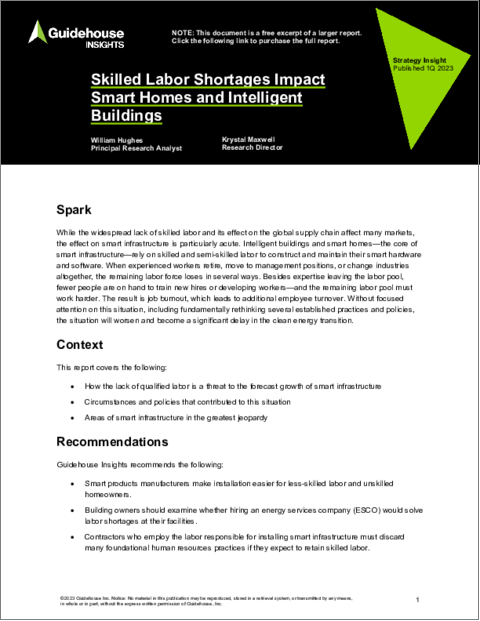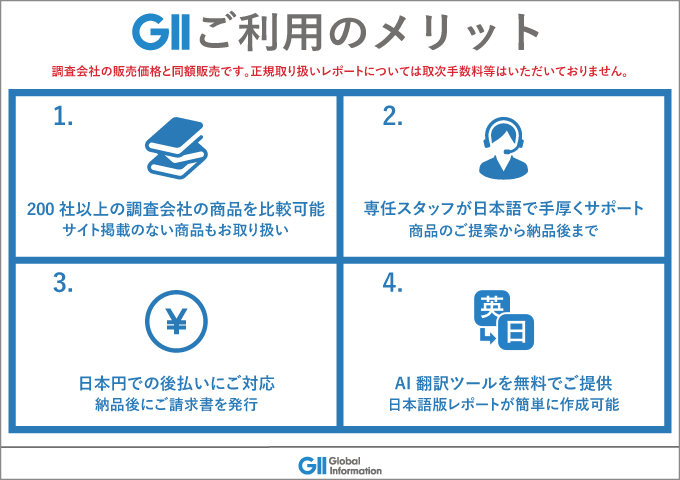|
|
市場調査レポート
商品コード
1249909
スマートホームとインテリジェントビルディング市場:熟練労働者不足の影響Skilled Labor Shortages Impact Smart Homes and Intelligent Buildings |
||||||
| スマートホームとインテリジェントビルディング市場:熟練労働者不足の影響 |
|
出版日: 2023年03月30日
発行: Guidehouse Insights
ページ情報: 英文 14 Pages; 4 Tables, Charts & Figures
納期: 即納可能
|
- 全表示
- 概要
- 図表
- 目次
スマートビルやスマートホームを含む一部のスマートインフラプロジェクトは、目的に応じたコントローラー、センサー、スマートマシンを用いて性能を向上させ、環境への影響を低減させるものです。一部のスマートホームプロジェクトは家庭で設置できますが、それ以上の多くのプロジェクト、そしてすべてのスマートビルプロジェクトは、設置やメンテナンスに熟練した労働力を必要とします。
当レポートでは、スマートホームとインテリジェントビルディング市場について調査し、市場の概要とともに、熟練労働者不足が及ぼす影響と問題点、今後の課題などを提供しています。
目次
概要
推奨事項
労働力不足は何十年にもわたって進行しており、コロナウイルスのパンデミックが状況を悪化させる
新型コロナウイルスによる人手不足は周知の事実
熟練した専門家の雇用主はより大きな課題を抱えている
建設会社の労働事情は厳しい
熟練労働者の不足は新しい問題ではない
スマートインフラに関連するスキルは不足しており、需要の増加が不足を悪化させる
ビルディングオートメーションシステムの設置と保守には、物理的なスキルとコンピューティングのスキルの両方が必要
ほとんどのスマートホームの仕事に必要なスキルレベルは重要
スマートインフラ導入の大幅な遅れを回避するには、常識を覆すことが必要
組織はより多くの人件費を支払う計画を立てる必要がある
請負業者は、ローエンドの従業員を含め、生産的な従業員の維持を妨げる人事ポリシーを排除する必要がある
建物の所有者と運営者は、スマートインフラを構築するためのリソースをアウトソーシングすることを検討する必要がある
スマートインフラメーカーは、スキルの低い労働者が製品を設置して試運転できるようにする製品を開発する必要がある
新しいホームビルダーは、スマートホームに関連するすべてのテクノロジーに投資する必要がある
List of Tables
Smart Commercial Building Automation Systems and Other Connected Systems
Level of Skill Needed to Integrate Elements into a Smart Home
List of Figures
- Commercial Building Automation Revenue by Segment: 2022-2031
- Smart Home Device Revenue by Technology, World Markets: 2022-2031
Some smart infrastructure projects, including smart buildings and smart homes, will improve performance and reduce environmental impacts with purpose-built controllers, sensors, and smart machines. While homeowners can install some smart home projects, many more of them, and all smart building projects, require skilled labor for installation and maintenance.
The "Great Reshuffle" in labor brought on by the coronavirus pandemic has worsened an already existing skilled labor shortage, but its origins can be traced to government policies from the 1980s, when the workforce associated with creating goods declined precipitously. Accepting the status quo-the lack of skilled workers in construction-will blunt the impact of many desirable government programs, public-private partnerships, and private efforts associated with installing smart systems. This will, in turn, jeopardize the timeframes for installing these systems and make some projects unviable, financially.
This Guidehouse Insights study identifies a range of ways to overcome this undesirable situation. It suggests that hiring organizations increase wages across the board for construction workers. Analysis shows that real wages for construction have decreased in the past decade despite increasing demand and worsening skill shortages. It recommends that construction subcontractors who make up much of this labor force, abandon conventional HR practices and focus on nurturing employee loyalty from all productive employees.
Table of Contents
Spark
Context
Recommendations
Labor Shortages Have Been Decades in The Making and the Coronavirus Pandemic Has Made the Situation Worse
The Problem of Employee Shortages from the Coronavirus Pandemic Is Well Known
Employers of Skilled Professionals Have a Greater Challenge
The Current Labor Situation Is Acute for Construction Companies
The Skilled Labor Shortage Is Not a New Problem
The Skills Involved in Smart Infrastructure Are in Short Supply and Increasing Demand Will Worsen the Shortages
Installing and Maintaining Building Automation Systems Requires Both Physical and Computing Skills
Skill Level Needed for Most Smart Home Jobs Is Significant
Challenging Conventional Wisdom Is Necessary to Avoid Large Delays in Implementing Smart Infrastructure
Organizations Must Plan to Pay More for Labor
Contractors Should Eliminate Personnel Policies That Inhibit Retaining Productive Employees-Including Those at The Low End
Building Owners and Operators Should Consider Outsourcing the Resources to Build out Smart Infrastructure
Smart Infrastructure Manufacturers Should Develop Products that Enable Less-Skilled Labor to Install and Commission Their Offerings
New Home Builders Should Invest in All the Technology Associated with Smart Homes




